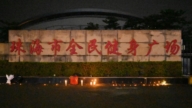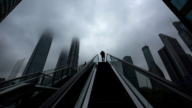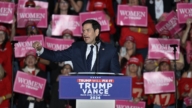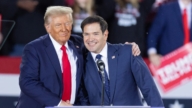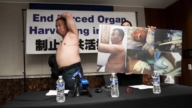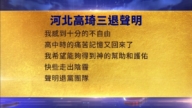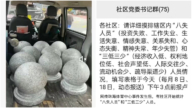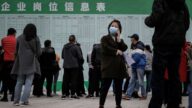【新唐人2013年11月09日訊】中共三中全會很快就要召開,中共喉舌不斷放風,中共將進行全面經濟改革。外界認為,30多年前,當中共面臨生存危機時,中共開始的跛足改革, 已經把中國和中共本身帶入到現在這種矛盾無解的境地,中共新政試圖再次在加強共產黨政治和意識形態控制的同時,進行由市場驅動的全面經濟改革,對延續中共殘喘的夢想將事與願違。
最近中共媒體大勢渲染,在9號召開的中共三中全會上,中共領導人習近平將羅列出一套全面的經濟改革計劃。他們想要通過鼓勵更多的市場競爭、私營企業、金融自由化和個人消費來推動經濟發展。試圖在加強共產黨政治和意識形態控制的同時,進行由市場驅動的全面經濟改革。
美國南卡羅萊納大學艾肯商學院教授謝田:「政治抓緊、經濟放鬆,恰恰是造成中國社會經濟今天這個狀況的根源,現在看來,中共提出的所謂的解決方式,仍然是繼續保持政治上的高壓,和經濟上的放活,這條路是沒有出路的,實際上是死路一條。」
20世紀70年代末,「文革」結束後,中國經濟瀕臨崩潰。面對東歐共產黨國家大規模罷工和動盪,中共政權也面臨嚴重的生存危機。時任中共領導人的鄧小平,開始了以國家支持和市場機會混合驅動下的改革。然而在這種強調以堅持共產黨的領導,以國家為中心的權力體制中,龐大的官僚機構、國有集團和共產黨的寡頭,獲得了巨大的財富和權力,造成中國的兩級分化嚴重。各地抗爭,維權運動此起彼伏。
伴隨經濟快速發展而帶來的是令人窒息的污染、地方政府債臺高築、低效而腐敗的壟斷,戶口和土地所有制度,則讓農村居民難以分享這個國家圍繞城市發展而取得的繁榮。
現在,中共領導人習近平和李克強,雖然聲稱三中全會的改革,將從以國家為中心轉到以市場為中心,不過習近平強化中共的領導一以貫之,而中共的權力和財富,以及它的執政合法性恰恰都來自於它在經濟中發揮的廣泛作用。專家質疑,習近平即將把這個國家和他自己推入一場有風險的實驗。
曾擔任中共領導人助手、參與了20世紀80年代中國市場改革的吳偉指出,如果不從政治層面上解決問題,這些經濟改革措施都會半途而廢。
時事評論員汪北稷:「中共現在走入的一個怪圈就是,只想發展經濟不想發展權利,是走不通的,一旦經濟意識上升,人們的自由、貨幣增加,他會去出國去旅行,看到國外的警察比較和藹,看到國外的空氣好,水好,回去又很痛恨中共,所以中共整體上意識不到,它的發展方向和它的目標是衝突的。」
近來中共大量討論安全問題,把安全問題從國家安全,逐步轉移到政權安全和意識形態安全。中共學者們認為,政治安全既是國家的主權安全,而政治制度、和執政黨執政活動、以及意識形態的安全尤為重要。
美國紐約城市大學政治學教授夏明:「從國家安全到政體安全,最後到意識形態安全,一方面反映了中共的惶恐和不安,認識到它的政權面臨著崩潰和瓦解的危險越來越增加,現在習近平已經把中國共產黨的重點從經濟建設轉移到捍衛意識形態安全。」
據中共喉舌總結,自1978年,中共首度開始改革開放以來,農村農業、市場經濟、改革發展成為出現頻率最高的關鍵詞,改革在中共歷次三中全會的公報中,出現達116次之多。
美國「紐約城市大學」政治學教授夏明指出,中共其實是在利用國家權力的同時,把市場經濟作為手段,為中共的寡頭、官員攫取財富,掠奪人民。而引進外資則和中國的廉價勞動力,兩廂結合,又給中共維持權利提供了一個新的剝奪機會。
採訪編輯/劉惠 後製/黎安安
Chinese Regime Third Plenary Dilemma: Save The Party or Reform
The Chinese Communist Party
(CCP) Third plenary is approaching.
Chinese state-controlled media began
highlighting proposed economic reforms.
Our experts believe that failed reforms 30 years
ago, when the CCP was at the eve of collapse, has
brought China and the CCP to this hopeless end.
Another reform under the current regime ideology,
with tyrannical control as priority, is doomed to fail.
Chinese state media reported on comprehensive economic
reforms that Xi Jinping will lead during the Third Plenum.
It is an idea to promote economic development, by
encouraging market competition, private businesses,
financial liberalization and more consumer activity.
It hopes to strengthen the regimes political
and ideological control, while conducting
comprehensive market-driven economic reforms.
Xie Tian, Professor at School of Business, University
of South Carolina Aiken: “Tightly grasping politics,
and relaxing the economy, are exactly the causes
of the current society and economy in China today.
The so-called reforms appear
to be taking the same approach.
Tight political pressure and a relaxed economy
is going nowhere, and it’s a dead end."
After the Cultural Revolution in the 70’s,
China’s economy nearly collapsed.
During the time period when Eastern European communist
countries faced massive protests and unrest, the CCP
was also facing a serious crisis for it’s own survival.
Then leader Deng Xiaoping began reforms, where were
driven by national support and market opportunities.
The CCP, central leadership, state power,
and state-owned enteprises became a
source of enormous wealth and power.
Severe differentiation, protests, and rights
movements are thus all over in China.
Rapid economic development is accompanied
by suffocating pollution, huge local government
debts, inefficient and corrupt monopolies,
and failing household and land systems.
Consequently, rural residents are marginalised
from the prosperity of the neighboring cities.
Current leaders Xi Jinping and Li Keqiang claim
that reforms in the Third Plenum will turn the
system from state-centered to market-centered.
Xi is insistant that the CCP leadership remains.
However, the power and wealth of the CCP and
its continued rule rely on the functioning economy.
Experts suspect Xi Jinping is leading the
country and his rule into a risky experiment.
Wu Wei is a former researcher at the Office of
Political Reform of the CCP Central Committee.
Wu also served as Secretary to the office’s director.
Wu indicated that in not solving problems
at the political level , these economic reform
measures will only end up failing half way.
Wang Beiji, political commentator: “The CCP is in
a vicious cycle of allowing economic development,
but not rights development, and its not going to work.
Once the economy improves, people are move more freely.
They may go abroad, and realize that policing is
more friendly, the air is fresher, and the water is better.
They will being to hate the CCP.
The CCP itself could not understand that its
development policies and goals are conflicting."
Recently, the CCP has focused on security issues.
These range from national security to
regime security and ideological security.
CCP scholars believe that political
security is a sovereign security.
Therefore, security in the political system, the ruling
party activities, and ideology is particularly important.
Xia Ming, Political Science Professor, City University
of New York: “From National Security, security for
the regime, and finally to ideological security, it
is only a reflection of the CCP’s fear and anxiety.
They recognize the regime is
facing collapse and disintegration.
Xi Jinping is shifting focus from economic
construction to defending ideological security."
Chinese state-media summarized that since 1978,
when the CCP first opened up and initiated reforms, rural
agriculture, market economy, and reform and development,
have become the most frequently occurring key words.
Reform has been mentioned 116 times
in previous communiqué of the Plenum.
Xia Ming suggests that the CCP manipulates state
power with a market economy to accumulate
wealth for officials and to rob the Chinese people.
Foreign investment, at the cost of the cheap labor in
China, has provided new opportunities for deprivation.
Interview & Edit / Liu Hui Post-production


